The 4th International Conference on Life Skills & Livelihood Skills – Leveraging Digital India for Rural Empowerment was successfully held on 16-17 November 2017, at Dr. MCR HRD Institute of Telangana, Hyderabad. The conference was organized by REEDS and LSLSI in collaboration with Telangana Academy of Skill and Knowledge (TASK) and Government of Telangana. The 2-day event saw enthusiastic participation from the speakers and the delegates that included professionals from skill development, agriculture and digital sectors, government officials and several students. Over 350 participants from 5 countries shared international perspectives on various themes related to digital technologies and it can be leveraged for rural empowerment in India.
The inaugural session began with an address by Mr. Ravindra Vikram M, Chairman REEDS, focusing on how digital revolution would empower democracy by giving easy to the underprivileged and marginal communities. He placed the need for enterprises to change their strategy to meet the challenges of digitization while he said that, “the power to transform through digitization lies with us. In the face of technology we are all equal, no one is denied access.” Expressing his views on this occasion, Dr. Richard W Oliver, Conference Chair, spoke about how India has the potential to become global superpower if digital technologies are used appropriately to empower the citizens. He presented four laws of digital that will create equitable opportunities, leaving little “time to waste and the need to act now’, since technology adoption has to be fast if it has to be fruitful, productive and profitable.
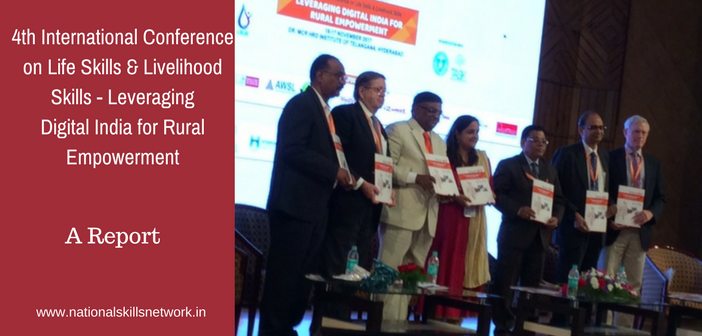 Speaking about the empowering youth from rural India through skill development Dr. Sailaja, Officer on Special Duty, TASK, stated that skilling is for personal growth, organizational impact, technical skills. In tune with the previous speakers, Mr. Vinod G, Former Minister – Labour and Employment, Government of Andhra Pradesh, emphasized the need for innovation in technology implementation in rural areas through simplification to ensure better accessibility and adoption. Dan Coholan, Vice-Chairman, RBC, Canada brought in the financial angle and dwelled on why India is becoming the favourite destination for foreign investments. By providing examples from various initiatives, he said that infrastructure is the key-differentiator for investments and India should focus on it for supporting its policies. In his presentation, Dr.K P Wasnik, Additional Commissioner, Agriculture, Government of India, highlighted the need for skilling in agriculture that is the source of livelihoods for 47% of the population by following NSQF certification and how RPL and re-skilling can help landless labourers to remain employable. The inaugural session closed with a vote of thanks from Dr Ravi Reddy, Conference Organizer.
Speaking about the empowering youth from rural India through skill development Dr. Sailaja, Officer on Special Duty, TASK, stated that skilling is for personal growth, organizational impact, technical skills. In tune with the previous speakers, Mr. Vinod G, Former Minister – Labour and Employment, Government of Andhra Pradesh, emphasized the need for innovation in technology implementation in rural areas through simplification to ensure better accessibility and adoption. Dan Coholan, Vice-Chairman, RBC, Canada brought in the financial angle and dwelled on why India is becoming the favourite destination for foreign investments. By providing examples from various initiatives, he said that infrastructure is the key-differentiator for investments and India should focus on it for supporting its policies. In his presentation, Dr.K P Wasnik, Additional Commissioner, Agriculture, Government of India, highlighted the need for skilling in agriculture that is the source of livelihoods for 47% of the population by following NSQF certification and how RPL and re-skilling can help landless labourers to remain employable. The inaugural session closed with a vote of thanks from Dr Ravi Reddy, Conference Organizer.
Technical Sessions
The inaugural session was followed by Technical Session 1 – Digital Infrastructure, foundation for success and Technical Session 2 – Financial inclusion or Financial illusion. The first technical session was chaired by Mr. Suresh Kumar – IAS and the speakers included Mr. B V R Mohan Reddy, Founder -Executive Chairman, Cyient; Dr. Carrie Oliver, MD, Yare Group, London; Dr. Ranjan Patnaik, Director, DuPont Knowledge Center.
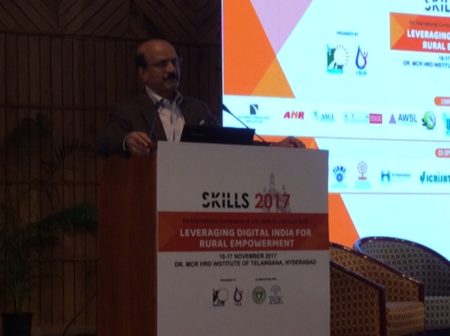 Delineating about various aspects of Digital India and its three components, viz, E-governance, Connectivity and Empowerment, Mr.B V R Mohan Reddy shared his perspective about how IOT is connecting people and things and the opportunities it creates for agriculture, financial inclusion and skilling. Dr. Carrie Oliver presented her views on the need to develop the right capabilities to initiate transformation through digital technologies. Dr. Ranjan Patnaik explained why digitization is merely a tool and we need to look into digital divide and digital redundancy in relation to productivity improvement.
Delineating about various aspects of Digital India and its three components, viz, E-governance, Connectivity and Empowerment, Mr.B V R Mohan Reddy shared his perspective about how IOT is connecting people and things and the opportunities it creates for agriculture, financial inclusion and skilling. Dr. Carrie Oliver presented her views on the need to develop the right capabilities to initiate transformation through digital technologies. Dr. Ranjan Patnaik explained why digitization is merely a tool and we need to look into digital divide and digital redundancy in relation to productivity improvement.
The second technical session Financial inclusion or financial illusion was chaired by Mr. Ravindra Vikram M and the speakers included Ms. Ruchi Khemka, VP – CSR, Deutsche Bank; Dr Ravi Kota, IAS, Principal Secretary, Department of Finance Government of Assam; Mr. Manas Ranjan Mohanty, General Manager, HRM Department, RBI.
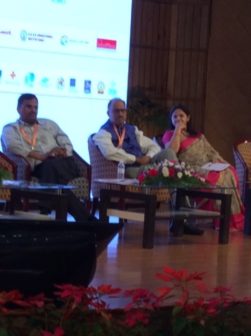 Providing a glimpse into various CSR initiatives for financial inclusion from Deutsche Bank, Ms. Ruchi Khemka expressed the dire need for behavioural changes among the rural population since out of 25 crore households in India, 1/3rd are still not banked. Dr Ravi Kota, spoke about how “financial inclusion was illusion until disrupted by demonetization” by narrating the case from Assam tea gardens where post-demonetization 6.5 lakh accounts were opening in 70 days in spite of many challenges. In a very engaging presentation, Mr. Manas Ranjan Mohanty related the diversity and complexity of India to the number of initiatives and why we need to understand and appreciate the role of regulation in financial domain and the importance of right social infrastructure for digitization of India.
Providing a glimpse into various CSR initiatives for financial inclusion from Deutsche Bank, Ms. Ruchi Khemka expressed the dire need for behavioural changes among the rural population since out of 25 crore households in India, 1/3rd are still not banked. Dr Ravi Kota, spoke about how “financial inclusion was illusion until disrupted by demonetization” by narrating the case from Assam tea gardens where post-demonetization 6.5 lakh accounts were opening in 70 days in spite of many challenges. In a very engaging presentation, Mr. Manas Ranjan Mohanty related the diversity and complexity of India to the number of initiatives and why we need to understand and appreciate the role of regulation in financial domain and the importance of right social infrastructure for digitization of India.
The first day closed with vote of thanks and translation of key points in each presentation into Telugu by Ravindra Vikram M who summed up the day saying, “for creating new models of partnership and collaboration one need not be literate but be digitally literate.”
Day 2
Day 2 of Skills2017 4th International Conference saw engaging discussions and interesting interactions with agri-scientists, academics, skilling companies, bureaucrats, technocrats and political leaders from the digital, education and agriculture space. The second day has four sessions – Session 1: Digital Education, Delivering the Demographic dividend; Session 2: Digital RX for Rural Health; Session 3: Digital Agriculture, plows to profit; Session 4: Valedictory session.
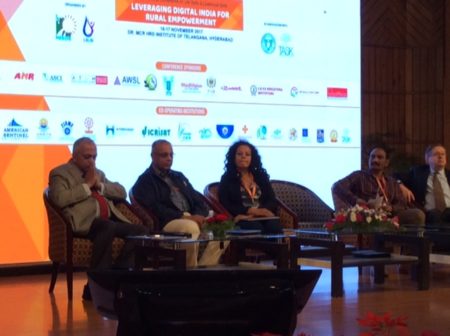 The first session, Digital Education, Delivering the Demographic dividend was chaired by Dr Richard Oliver and the speakers included Dr.Amarnath Raja, Executive Chairman, InApp; Mr. Anand Sudarshan, Founder & Director at Sylvant Advisors Private Limited; Prof K C Reddy, Former Chairman, APSCHE, Mr. Ramesh K Raju from Osmania University, Ms. Raquel Shroff, Group CEO, Global Education Services.
The first session, Digital Education, Delivering the Demographic dividend was chaired by Dr Richard Oliver and the speakers included Dr.Amarnath Raja, Executive Chairman, InApp; Mr. Anand Sudarshan, Founder & Director at Sylvant Advisors Private Limited; Prof K C Reddy, Former Chairman, APSCHE, Mr. Ramesh K Raju from Osmania University, Ms. Raquel Shroff, Group CEO, Global Education Services.
Dr Amarnath Raja narrated the story of Kerala’s digital initiatives right from the inception and how it saved several crores of rupees by using open source software. He urged everyone to try out all the open learning software in schools for 10th standard students. Mr. Anand Sudarshan spoke about how digital education can be used as a remarkable tool in transforming the future of India. He touched upon issues related to digital divide and the challenges of democratizing education to expand its reach, affordability and access.
Prof K C Reddy talked about how digital technology can impact rural and global economies. He stressed on simultaneous investment in social sectors since social, physical and digital Infrastructure is important in creating an equitable world. Mr. Ramesh K Raju showed how video help is fast replacing user manuals through technical communication for VAK (Visual, auditory and kinesthetic) learners. Pointing out that unemployability a bigger problem than unemployment. Ms. Raquel Shroff, spoke about Mykensho, a holistic, inclusive integrated in school curriculum from class 6 to 12 that aims at educational transformation through digital technologies. She also shared interesting insights from her experience in Australia.
The speakers in the second session included Dr G Vivekananda – Advisor , Inter-state affairs Government of Telangana; Dr. J Satyanarayana, IAS, Chairman UADAI, Advisor for Govt of A P in eGovernance; Mr. Bobba Venkatadri, General Partner, Ventureast; Gerald Jaideep, CEO Medvarsity; Dr Srinivasa Rao Pulijala, CEO, Apollo MedSkills.
The second session, Digital RX for Rural Health began with a presentation from Dr G Vivekananda. He shared insights on how digitization can help agriculture with reference to agricultural reforms in Telangana that needed new skills to improve growth. This was followed by an enlightening talk by Dr. J Satyanarayana, IAS. Speaking about leveraging Digital India for rural Development, Dr J Satyanarayana described the volume and variety of digital initiatives for inclusion, accessibility and the pilot project, Bhudaar in Andhra Pradesh, where every plot of land is given a unique ID on the lines of Aadhaar.
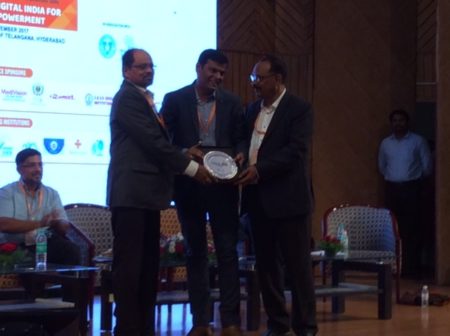 In the context of digital healthcare, Mr. Bobba Venkatadri, explained why digital health is the next big frontier as it addressed critical needs of finding affordable and quality medical help. His talk focused on how we can bring in convergence between biology and technology. The presentation by Mr.Gerald Jaideep, focused on visualizing a Digital Future for Rural Healthcare in India. He established the need for application of knowledge and how Medvarsity is using latest technologies and low cost tools to complement traditional medical learning. Dr Srinivasa Rao Pulijala spoke about need for the synergies between Digital India and Skill India and shared the story of Apollo Medskills in training and placing youth in various parts of India. He also informed the audience about how digital tools are being used to mobilize the right candidate for skilling to avoid attrition.
In the context of digital healthcare, Mr. Bobba Venkatadri, explained why digital health is the next big frontier as it addressed critical needs of finding affordable and quality medical help. His talk focused on how we can bring in convergence between biology and technology. The presentation by Mr.Gerald Jaideep, focused on visualizing a Digital Future for Rural Healthcare in India. He established the need for application of knowledge and how Medvarsity is using latest technologies and low cost tools to complement traditional medical learning. Dr Srinivasa Rao Pulijala spoke about need for the synergies between Digital India and Skill India and shared the story of Apollo Medskills in training and placing youth in various parts of India. He also informed the audience about how digital tools are being used to mobilize the right candidate for skilling to avoid attrition.
The speakers in the third session included Dr. V.V. Sadamate Former, Advisor, Agriculture, Planning Commission of India; Siddika and Ashok (budding entreprenuers), Venkata Krishna V – Global practice leader – ITC Infotech ; Dr Suhas P Wani, Research Program Director, ICRISAT; Mr. Shaik N Meera – Principal Scientist – ICAR, IRRI; Mr. M. Moni , former Director General, NIC; Professor Venku Reddy.
The third session was chaired by Dr. V.V. Sadamate. He invited project presentations from Siddika and Ashok. Siddhika spoke about her research project has created a Mobile App for an online seafood bazaar called Mowen and Ashok had created an App called Vari connecting farmers with markets where Real time agricultural data where big data meets big opportunity.
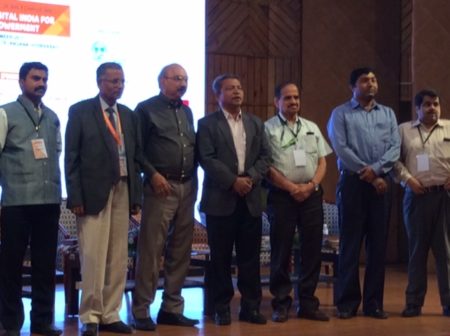 This was followed by a presentation by Mr. Venkata Krishna V detailing the digital initiatives from ITC with learnings from eChoupal. He spoke about how eChoupal gave digital boost to Indian Agriculture by decoupling information from transaction. Dr Suhas P Wani, presented his views about the challenges faced in agriculture and how digital technologies can reduce the knowledge gap between scientists and farmers to increase productivity. He referred to projects like Krishi Gyan Sagar that uses online monitoring for better crop management. Mr. Shaik N Meera made a brief presentation on disruptive technologies in agriculture that included Telescopic, Microscopic, Remote control and Processors. Mr. M. Moni shared his rich experience in implementing several digital initiatives in India and expressed dissatisfaction about how it yet to impact the domain of agriculture. He suggested that India should has specialized agricultural polytechnics and ITIs to equip more youth with the right skills for livelihoods in agriculture. He also placed the need for agricultural resources information systems, digitized records, risk management and digitized access to finance, credit and marketing systems. Mr. Sanjeev Panwar made a brief presentation on the need for Mera Gaon Mera Gaurav type of innovations that are already in place for farmers. Professor Venku Reddy emphasized on the need for integrated technologies in promoting allied sectors like fisheries and marketing and the need to replicate and scale eChoupal.
This was followed by a presentation by Mr. Venkata Krishna V detailing the digital initiatives from ITC with learnings from eChoupal. He spoke about how eChoupal gave digital boost to Indian Agriculture by decoupling information from transaction. Dr Suhas P Wani, presented his views about the challenges faced in agriculture and how digital technologies can reduce the knowledge gap between scientists and farmers to increase productivity. He referred to projects like Krishi Gyan Sagar that uses online monitoring for better crop management. Mr. Shaik N Meera made a brief presentation on disruptive technologies in agriculture that included Telescopic, Microscopic, Remote control and Processors. Mr. M. Moni shared his rich experience in implementing several digital initiatives in India and expressed dissatisfaction about how it yet to impact the domain of agriculture. He suggested that India should has specialized agricultural polytechnics and ITIs to equip more youth with the right skills for livelihoods in agriculture. He also placed the need for agricultural resources information systems, digitized records, risk management and digitized access to finance, credit and marketing systems. Mr. Sanjeev Panwar made a brief presentation on the need for Mera Gaon Mera Gaurav type of innovations that are already in place for farmers. Professor Venku Reddy emphasized on the need for integrated technologies in promoting allied sectors like fisheries and marketing and the need to replicate and scale eChoupal.
Dr. Richard Oliver summarized the sessions by highlighting the three big issues – scale, scope, speed of digitalization.
The speakers in the valedictory session included Mr. Jalil (Gary) Khan Hyderabad Conventio Visitors Bureau (HCVB); Mr. Vishweshwar Reddy Konda, Member of Parliament, Chevella, and Mr. Y S Choudhary , Minister of State for Science, Technology and Earth Sciences.
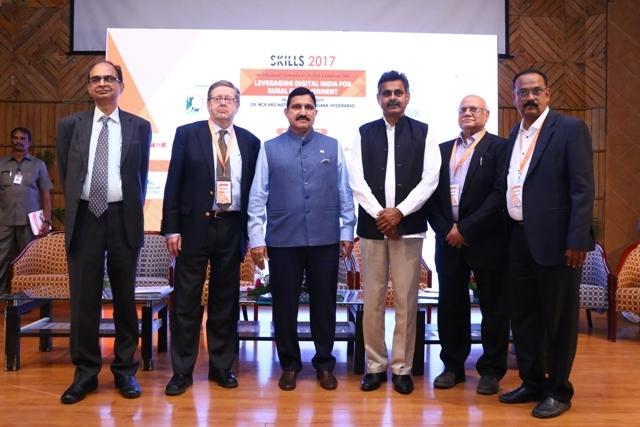 Mr. Jalil Khan exhorted the need for promoting Hyderabad as a destination for international events by referring to the upcoming Global Entrepreneurs Summit (GES 2017) and talked about the tremendous potential in Hyderabad and why the city is becoming the preferred destination for investments. Mr. Vishweshwar Reddy Konda, brought in the dimension of skilling and shared details about the demographic dividend that has great potential to transform the economic future of country. He also suggested that skill development programs must be linked with the needs of the industry and fast changing technologies, new and emerging job roles while making a case for promoting apprenticeships. Driving home the significance of the theme of the conference, Mr.Y S Choudhary stated in his address “there’s huge opportunity ahead of India to skill and employ rural youth and also encourage them to become entrepreneurs.” He mentioned various schemes from the government like Mudra loan that aids financial inclusion. Stressing upon the fact that “there is no instant coffee in skills and job placement” he reiterated the need to create sustainable social infrastructure to promote skill-based careers. He also shared valuable observations on how digitization will create new jobs for which people need to be re-skilled. He offered to help budding entrepreneurs with appropriate funding.
Mr. Jalil Khan exhorted the need for promoting Hyderabad as a destination for international events by referring to the upcoming Global Entrepreneurs Summit (GES 2017) and talked about the tremendous potential in Hyderabad and why the city is becoming the preferred destination for investments. Mr. Vishweshwar Reddy Konda, brought in the dimension of skilling and shared details about the demographic dividend that has great potential to transform the economic future of country. He also suggested that skill development programs must be linked with the needs of the industry and fast changing technologies, new and emerging job roles while making a case for promoting apprenticeships. Driving home the significance of the theme of the conference, Mr.Y S Choudhary stated in his address “there’s huge opportunity ahead of India to skill and employ rural youth and also encourage them to become entrepreneurs.” He mentioned various schemes from the government like Mudra loan that aids financial inclusion. Stressing upon the fact that “there is no instant coffee in skills and job placement” he reiterated the need to create sustainable social infrastructure to promote skill-based careers. He also shared valuable observations on how digitization will create new jobs for which people need to be re-skilled. He offered to help budding entrepreneurs with appropriate funding.
The conference concluded with closing remarks from Mr. Ravindra Vikram M and a determination to carry forward the recommendations from the sessions. He thanked all the participants, sponsors, co-operating institutions and the delegates for making it a remarkable event that created a platform to present and discuss several issues related to rural empowerment through digital technologies












